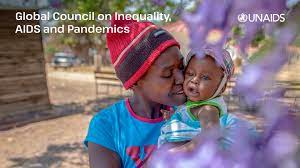By Haruna Gimba
Brazil is hosting the announcement of the new Global Council on Inequality, AIDS and Pandemics.
To be chaired by The First Lady of Namibia, Monica Geingos, the Director of the University College London Institute for Health Equity, Sir Michael Marmot and the Nobel prize winning economist, Joseph E. Stiglitz. Brazil’s Minister of Health, Nísia Trindade, is a founding member.
“I am delighted to host the announcement of the Global Council on Inequality, AIDS and Pandemics. It is time to convert lessons learned into action by reducing the inequalities driving today’s health crises and strengthening pandemic preparedness for the future,” said Ms Trindade.
“Brazil is determined to play its part by making the case for increased collaboration and evidence-based policymaking to build more resilient health systems around the world.”
Social and economic inequalities within countries and between them are exacerbating and prolonging pandemics and amplifying their impact amongst the poorest and the most vulnerable.
The same intersecting inequalities that drive HIV, COVID-19, MPox and other diseases are leaving countries and communities at risk of future outbreaks and pandemics. But experience shows that there are actions at the global, regional and national levels that can build pandemic responses that reduce rather than exacerbate inequality.
The work of the Global Council will harness essential evidence for policymakers and elevate political attention to the need for action to end inequalities that fuel AIDS and other pandemics. Crucially, it will encourage and support frontline communities to advocate for the policy shifts necessary to fight current pandemics and better prepare for tomorrow’s outbreaks.
“The AIDS response is one of the best examples of how communities experiencing intersecting inequalities can unite to overcome them and save millions of lives,” said UNAIDS Executive Director, Winnie Byanyima who is a member of the Global Council and is in Brazil for the announcement.
“A broad movement of people living with and affected by HIV has brought down the price of medicines and diagnostics, strengthened national health responses, enabled the rise of a strong network of community-led organizations and secured the removal of punitive discriminatory laws in many countries.
“But evidence-based policies and approaches need to be applied everywhere and for everyone and sadly that’s not the case right now.”
Gender-based inequities endanger the health of women around the world. For example, in countries including Ghana, Côte d’Ivoire, and Liberia HIV prevalence for young women is more than 5 times more than young men of the same age-reflecting, in part, economic and education inequality.
“Gender inequality provides fuel to pandemics like AIDS and COVID-19” said the First Lady of Namibia, Monica Geingos. “It increases the vulnerability of women and girls to deadly viruses by limiting access to knowledge, financial resources, and life-choices and undermines their ability to protect themselves and their families. We have to re-imagine pandemic responses that can reduce inequality rather than exacerbate it.”
“Inequalities in access to health and other essential services are largely the result of deliberate policy choices,” said Joseph Stiglitz. “To fight future pandemics, we must learn the lessons of the HIV response and adopt inequality-busting approaches to make the world a healthier, fairer and safer place for everyone.”
Successes and failures in the HIV response provide valuable lessons on how the world can deal with future pandemics. For example, gay men are more likely to be living with HIV. But laws and policies drive the size of the gap.
In Malaysia where gay men are criminalized and arrested gay men are 72 times more likely to be infected than other adults; but in Thailand where same-sex relations are legal and community pandemic response is strong, gay men are only 12 times more likely.
Viruses’ cross population groups. These contribute to why Thailand, with lower inequality, is approaching epidemic control while Malaysia is losing ground in the fight against AIDS.
Meanwhile, the issue of inequality extends beyond HIV to other pandemics. Countries with higher income inequality, for example, have experienced greater COVID-19 mortality.
At the height of the COVID-19 pandemic, wealthy countries spent billions of dollars on responses but almost half of developing countries were forced to cut health spending, undermining the capacity to fight global pandemics.
Several countries in Africa continue reporting significant numbers of MPox deaths during the pandemic, yet the vaccines being used in high-income countries are not available.
Even within countries that have made good progress against HIV, some communities have struggled to benefit from the staggering pace of medical advances.
In Brazil, HIV infections are falling dramatically among the white population as access to treatment is widened and new prevention tools such as PrEP are rolled out but HIV infections among the black population are still on the rise.
“Evidence-based strategies to address the social determinants of health are crucial not only for improved health outcomes for the individual but also for building stronger economies and fairer societies,” said Sir Michael Marmot, from Brasilia.
“Health is a good marker of how well a society is doing overall. Health equity tells us about societal inequalities.”




